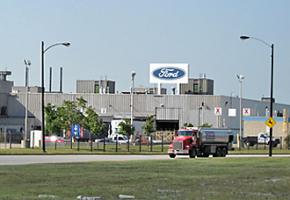Time to fight back at Ford
, a worker at Ford's assembly plant in Chicago and member of United Auto Workers (UAW) Local 551, issued this leaflet about the stakes in the union's contract negotiations, under the headline "Exceed Our Expectations."
CONTRACT NEGOTIATIONS with the Big Three and United Auto Workers-represented automakers are already well underway. American autoworkers have taken a tremendous hit over the past decade. We've given till it hurts, and then been expected to give some more. We've also lowered the standard of living of those that came before us, and those that will carry on after us. Why?
We are not alone in this trend. We've seen it happen before; first to the air traffic controllers, then to the steelworkers, the airline workers and most recently the state employees. Why is it that the workers are the ones that must sacrifice?
Capitalism and entrepreneurial endeavors are supposed to involve risk. That's the nature of the free market. But when we see Alan Mulally and Bill Ford make huge bonuses and salaries, while our wages and benefits are slashed and our brothers and sister are thrown out of work by plant closings, it becomes obvious that the risk has been redirected to the workers.
Mulally's compensation included a $26 million salary and a $57 million profit-sharing bonus. Compared to a seniority autoworker's $60,000 salary and $5,000 profit-sharing bonus, Mulally made 1,276 times what an average autoworker made. Compared to the average second-tier worker, the difference is an even more obscene 2,515 times an average long-term supplemental autoworker. And he hasn't worked here much longer than you! No, he doesn't own Ford Motor Company, he's just an employee. Albeit a handsomely paid one.

You want to trim some fat? There's a good place to start. You can then follow up with the Chairman of the Board, the Chief Financial Officer, the Director of Labor Relations and the President of the Americas for starters. These aren't entrepreneurs, they're overpaid zealots--many of whom made some awful decisions that put this company on the brink of collapse. Give Mullally credit for leading the turnaround at Ford, but come on, $83 MILLION in a year?!
You think this is class warfare. You're damn right it's class warfare, and the workers of this country are getting slaughtered. It's time to FIGHT BACK! We've given up plenty to help this company succeed. Now, we want our just reward for that sacrifice.
SINCE 2003, we've given up raises. We've given up performance bonuses that were agreed to in place of raises. We've given up cost of living allowances. We've given up break time. We've given up Christmas bonuses. We've given up overtime after eight hours. We've given up a holiday. We've given up secure health care costs in retirement. (Most of us are hoping to get there comfortably some day.)
Most of all, we've given up solidarity through the two-tiered wage structure. What we didn't give up was our right to strike over wages and benefits.
At a [Ford] "Town Hall Meeting," we were shown a nice flow chart of how the wage structure allows second-tier employees to flow into the top tier as older employees retire. For the first second-tier employee to reach top tier, Ford would have to hire over 8,000 new full-time employees. I'm not optimistic that will happen within the next 10 years. They're still closing plants! The Twin Cities Assembly Plant is scheduled to close later this year.
The rub is that we have the final say on our contract. No matter what we're told about how we should be compensated, or that we can't expect too much, we know that IF WE ARE SHORTCHANGED, WE CAN JUST SAY NO.
That's what we did for the October 2009 contract modification, and if we stick together again, we can get a good agreement. I've given plenty of thought to what I expect from the upcoming agreement in order to vote yes for it.
1. Long-Term Supplemental language and Temporary Part-Time language has to disappear. We should not have dues-paying union members that are disposable.
2. Two-tier must go. A reasonable time-based path to full pay and benefits is the only course for union cohesion. Companywide percentages for the different tiers can be manipulated too easily, and it's unfair and it affects all of us. In the Agricultural Implement sector of our union, two-tier has been used to stagnate top-tier wages. Tier one employees have forgone raises for several consecutive contracts to allow tier two to get bigger increases.
3. Reinstate Cost of Living Allowance (COLA). Without COLA or any wage increase our real purchasing power continues to declined steadily.
4. Wage increase. The last wage increase autoworkers received was six years ago-- September 2005.
5. More money for the VEBA [Voluntary Employee Beneficiary Association, a union-controlled trust fund that pays for retiree health care]. Retiree health care costs have increased dramatically. At the same time, their health care choices have been diminished. Retiree prescription costs went from $10-$16 for medications to $25 for tier one medicines, $60 for tier two prescriptions and $160 for tier three. Some medications are no longer covered at all.
Retirees are also facing dwindling HMO options. Some places have no HMO option at all. Because his HMO was being eliminated, my father was faced with the dilemma of keeping the doctors that he has had for years and paying out of pocket for all doctor visits, or finding all new doctors in a new HMO network.
Brothers and sisters: considering Ford's profits and their willingness to overpay executives, these demands are quite reasonable. We shouldered most of the burden to turn this company around. It's time we got our share! LET'S STAND IN SOLIDARITY FOR ECONOMIC JUSTICE!
In solidarity, Scott Houldieson


